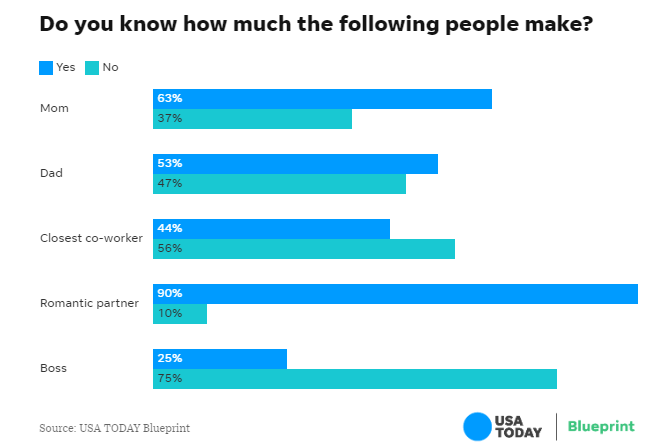Salary transparency is a hot topic on social media right now, with Gen Z leading the charge for more open discourse in the workplace. It’s a popular position — a new USA TODAY Blueprint study found that 57% of professionals are open to sharing their salary information, thinking it would benefit the whole workforce.
But not everyone feels the same way. The study also sheds light on a major generational divide, most noticeably between the youngest and oldest American professionals.

Generational divide on salary transparency
There’s a clear generational clash brewing over how open companies should be about compensation. Millennials and Gen Z are pushing for transparency, with a whopping 83% of Gen Z comfortable sharing their salary compared to just a third of baby boomers.
This openness likely stems from a feeling of being underpaid — 40% of Gen Z believe they’re not getting their fair share, especially relative to their elders.
The desire for transparency isn’t limited to rank-and-file employees. Even young managers are more comfortable with salary openness than their older counterparts, suggesting that they too want to make compensation a talking point rather than a taboo.
Despite some discomfort among older managers, a surprising 83% of all Americans believe employees would benefit from full salary transparency. This suggests a potential win-win for both workers and companies: fairer pay, and more trust and personal investment, which encourage retention.
Managers’ opinions on salary transparency
Not all managers are thrilled about being an open book when it comes to their pay. Nearly half (45%) expressed discomfort with their team knowing their exact salary. This might stem from concerns about resentment or comparisons.
But consider this: Transparency can actually be a management tool. Over half of managers surveyed believe it helps attract and retain top talent, which aligns with what workers themselves are saying — 81% of Americans state it would positively influence their decision to take a job. So maybe some temporary discomfort is worth these potential benefits.
Also, having the company pay structure exposed might not rattle the workforce as much as some fear. Only 18% of professionals would feel guilty earning more than a colleague, and a surprising few of us (just 25%) even know what our bosses make.
Potential outcomes of salary transparency
With almost two-thirds of Americans believing salary transparency would lead to fairer pay, the days of feeling shortchanged in the dark might be numbered. Transparency could also mean bigger bucks for everyone — nearly half of respondents (45%) think it would bump up wages overall, with 37% anticipating a boost to morale.
But it’s not all sunshine and rainbows. Some worry about a green-eyed monster rearing its ugly head, with 3% predicting jealousy and 39% fearing general workplace friction.
5 Negotiation Tips for Gen Z(Opens in a new browser tab)
Older generations seem less fazed by potential drama. While transparency would sway most age groups in their job search, nearly 40% of those between 60 and 78 wouldn’t let it affect their decision, compared to just 11% of Gen Xers.
So, will transparency unleash a pay utopia or ignite office tension? Only time will tell, but one thing’s for sure — the way we talk about salaries is due for a shakeup.